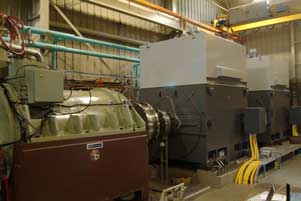About CAPS
 CAPS is dedicated to creating the focus and resources needed to develop and implement an overall Systems Driven Strategy focused on the high level system issues of power distribution, system control, performance and component needs of tightly coupled power systems typical of advanced transportation power systems.
CAPS is dedicated to creating the focus and resources needed to develop and implement an overall Systems Driven Strategy focused on the high level system issues of power distribution, system control, performance and component needs of tightly coupled power systems typical of advanced transportation power systems.
By concentrating on broad industry objectives, CAPS provides the mechanism for government and industry to capitalize on a joint infrastructure to produce advanced power systems and components.
CAPS focuses on:
- Reliability and flexibility - ability to survive faults and/or damage, ability to adapt to changing conditions, reduction in number of special components, and simplification
- Performance - efficiency, responsiveness, and power quality
- Power and energy density - size, weight, and performance
- Life cycle economics - including related systems, existing business and infrastructure, and overall life cycle costs.
Our Mission
The CAPS mission has four thrusts:
- Develop a multidiscipline program for graduate and undergraduate education in advanced power system engineering
- Develop research programs strongly focused on simulation and modeling of advanced power systems supported by test facilities, materials research and superconductivity technology
- Develop strong partnerships between government, industry, and the academic research community
- Advance the state-of-the-art of electric power technology through identifying and developing "dual-use" opportunities
Our Vision
Recent advances in new materials and technologies are presenting significant new system challenges for electric power systems engineers, such as:
- Superconductivity
- High strength permanent magnet materials
- Power semiconductors
- Control technologies
Transportation applications are a significant driver and source of "high value" applications that can drive development of advanced power systems. Leading system candidates for advanced technologies are:
- All-Electric ships for the All-Electric Navy
- High speed rail and maglev systems
- Magnetic assisted launch for both aircraft and space craft
- Aircraft/spacecraft systems
Transportation applications are functional precursors to utility and industrial applications:
- Superconductivity, lower losses, new applications (fault limiting, transmission, energy storage, equipment)
- Permanent magnets - machines, efficiency, performance
- Power semiconductors - control, performance
- New control technologies
The combination of new technologies and new applications provides many opportunities for a new generation of engineers to:
- Develop innovative concepts and equipment
- Bring new approaches to existing and new problems
- Work at the forefront of new technologies
Development of new technologies should take place in the broadest possible systems context to maximize the advantages of "dual use" product development. Many of the issues surrounding electric power network reliability, robustness, and controllability are common to the military, industry, and utilities. Exploit these commonalities to accelerate the development and deployment of new power technologies.

